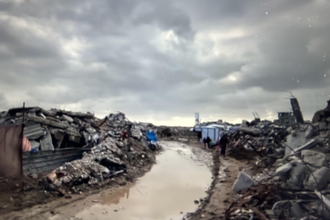Statement on the film: 'Song For a Ragged Boy'
(Fr Peter is president of SIGNIS, the World Catholic Association for Communication)
Song for a Raggy Boy is one of several Irish films, made in 2001-3, on themes of physical and sexual abuse in the Irish Catholic Church. They include The Magdalene Sisters, Sinners, Evelyn, Conspiracy of Silence.
Audiences who regret the dramatisation of Catholic scandals on screen will be upset by these films. The films can be seen, however, as a necessary part of people's coming to terms with abusive behaviour by official church personnel, an acknowledgement that it occurred and had lifelong damaging effect on victims, that compassion was sometimes slow in coming from the authorities and that alarm led to slowness or reluctance in dealing with abuse. This is part of the church's examination of conscience concerning revelations about what has occurred in recent decades. Patrick Galvin, author of the novel on which the film is based, spoke about the effect of writing the book and of collaborating on the film as an 'exorcism' of the past for himself. Often the victims want only an acknowledgement by the church and the perpetrators that these events happened.
This film is set in 1939 in a reform school for boys, some younger than twelve, managed by the local bishop with a priest in charge and staffed by brothers. The brother-prefect is a stern disciplinarian who resorts to excessive physical punishment and humiliation of the boys. One brother is a sexual abuser. There is only one sequence of sexual abuse, visually reticent, but all the more horrendous because of this. It is a disturbing reminder of the reality of such abuse, the pathology of the brother and, particularly, the pain of the reluctant victim who speaks of this in the confessional and is advised to keep what has happened to him to himself.
The physical abuse is alarmingly violent and, dramatically, over the top. Many older Catholics, however, will have stories of these kinds of punishment. For the sake of the narrative, they are put together in a hundred minute film which can give an impression that this was the sole way of dealing with problems.
Song of a Raggy Boy, like the other Irish films (and the presentation of dominant clergy in such films as Ryan's Daughter, The Butcher Boy or Lamb) asks pertinent questions about the severity of the Irish Church, the collaboration with the state in running institutions of correction (and using the same methods of discipline and punishment that were prevalent in those times in state and other institutions) and the screening and training of clergy and religious.
Older Catholics and members of religious congregations can attest that in those decades, and even up to the 1960s, training was often very harsh, a formation in subduing the will by self-denial and severe and penitential practices that led to a sometimes morbid spirituality. The renewal in religious congregations asked for by the Second Vatican Council was intended as a rediscovery of the original Gospel spirituality of the founders with a consequent spiritual, moral and psychological maturity.
Processes of healing of memories have been encouraged. This film is a reminder that religious men who entered an order in their mid teens and underwent this kind of formation absorbed it and saw it as the pattern for their ministry in schools but applied it sometimes in unconscious compensation for their lack of emotional development.
Actor, Iain Glenn, who portrays the sadistic Brother John, is quoted as using this kind of background to understand how his character could act in the way that he is portrayed.
It should be noted that there is a sympathetic older brother, played by Dudley Sutton, and a superior who wants change and compassion but who has learned to live with the limitations imposed by authoritarian superiors.
This is not to say that the film is joyless - a comment made on The Magdalene Sisters. In fact, the model for the film is the genre of dedicated teacher (Dead Poets Society, Dangerous Minds, The Emperor's Club, Mona Lisa Smile) who comes in to share a passion for their subject (here English and Irish language and poetry), educates students and transforms them as well as challenging the status quo. Aidan Quinn is William Franklyn, a veteran of the Spanish Civil War, who is the first lay teacher in St Jude's school.
Critical comment on the film has been quite varied. It has been invited to several festivals, from Karlovy Vary to Hong Kong. Many critics, who are not aware of the realities underlying the plot, have dismissed it (and laughed at it) as over-dramatic, even hysterical. Those who know the issues from the inside may agree that the violence shown, especially towards the end, is too much for the drama to be fully effective, but will find much in the film that speaks to their experience, much to reflect on.
[Post-script: Catholics will notice quite a number of erroneous details, from vestments and selection of religious pictures to thinking that brothers are ordained. Advice from a technical adviser would have quickly remedied them.]















